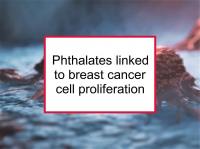Phthalates are used to make plastics more pliable and as additives in personal care products. Food packaging, body lotions, and face creams are sources of exposure. Phthalates have estrogenic effects, but can also induce proliferation and of hormone receptor negative (ER-) breast cancer cells independent of any estrogenic effect.
Latest research finds very low levels of phthalates can be harmful
The study referenced at the beginning of this news story was designed to examine the influence of phthalates on the growth of hormone receptor positive MCF-7 breast cancer cells. To conduct the study, the authors treated MCF-7 cells with butyl benzyl phthalate (BBP), di(n-butyl) phthalate (DBP), and di(20ethylhexyl) phthalate (DEHP) at various concentrations for periods ranging from 24 hours to 92 hours. The cells were then harvested for analysis, including assessing the levels of proteins involved proliferative and apoptotic (programmed cell death) pathways.
Treatment levels greater than 10−5 M for DEHP and 10−4 M for both BBP and DBP were toxic for the breast cancer cells. However, cell proliferation was found to be significantly increased at the far lower levels of 10−8 to 10−5 M for BBP and DBP, and 10−8 to 10−6 M for DEHP. This was accompanied by changes in proliferating cell nuclear antigen and other proteins involved in apoptosis and proliferation. In addition, estrogen receptor alpha expression was notably increased by treatment with BBP, DBP, and DEHP. The authors conclude that BBP, DBP, and DEHP are capable of inducing a proliferative effect even at a very low concentrations. In addition, these phthalates also demonstrate estrogenic activity. Therefore, the current guidelines regarding phthalate exposure defined by the government should be further evaluated, according to the authors.
Please see our articles on phthalates and bisphenol A for more information on endocrine disruptors and breast cancer.
